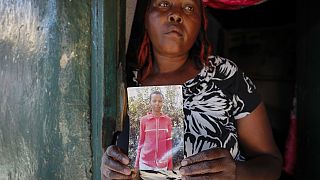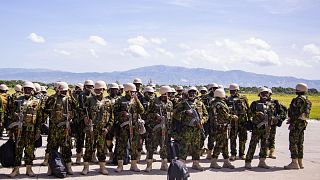Kenya
66 years after Kenyan liberation icon Dedan Kimathi was executed by the British colonial rulers, calls for unequivocal apology still echo.
Kenyan police on Wednesday (Nov. 1) blocked a group known as the Social Justice network, from holding demonstrations in Nairobi to protest King Charles visit.
Around 30 members of the group chanted songs and threw red roses at the foot of the monument of Mau Mau veteran Dedan Kimathi in the Central Business District, but a contingent of uniformed and plain clothed police officers dispersed the protesters and confiscated their banner.
It was unclear whether any arrests were made.
The activists demanded Tuesday (Oct. 31) an apology for colonial-era crimes and that the British permanent base (BATUK) be closed. Groups have documented and denounced crimes allegedly committed by British soldiers stationed in central Kenya.
"What we want is for King Charles to say, 'we apologise to the Kenyan population and the descendants and generations that have suffered because of the atrocities and barbarity committed by the British people during the reign that they were here'."
"All the land under British should be given back to the Kenyan people and we also want BATUK (British Army Training Unit Kenya) to leave our land. BATUK has to go. The Kenyan people in Laikipia cordially welcomed them and then they subjugate them, they dominate them, they treat them as though they are second class citizens in their own country?"
Kenya has had a close and at times challenging relationship with Britain in 60 years of independence.
Political analyst and journalism and communications professor Herman Manyora says African leaders have had a say in their relationship with their former colonial rulers.
"I don’t blame the British. I blame African leaders who are subservient to the British and the French. Why are they subservient to them? Because they ravage their own countries, they rape their own countries, they steal from their own countries. So they seek recognition and protection. If you did not relate to the British and the French in that kind of manner, you are able to tell them off, you are a sovereign state. But because you relate from a subservient point of view, you see them as Gods."
Britain's monarch visited a war cemetery on Wednesday (Nov. 01). On the roads leading there, at a walking distance from the central business district, authorities deployed heavy security including army, an anti-terror police unit, elite units and regular police. Traders and passersby were allowed to use only one side of the road.
At a state banquet on Tuesday (Oct. 31) Charles III said there was 'no excuse for wrongdoings of the past' but did not apologize.











00:28
Nairobi hawker shot at close range by police declared brain dead
00:48
Death toll in Kenyan anti-government protests rises to 16, says rights group
01:07
Kenya prepares for first anniversary of Finance Bill protests
01:52
UN's crucial humanitarian aid work faces a clouded future amid cuts in funds
02:00
Refugees in Kenyan camp face hunger after USAID funding freeze
01:00
Pix of the Day: June 19, 2025